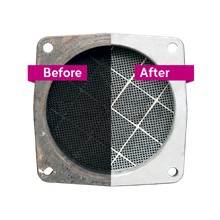Stricter rules on emissions form a major part of amendments to the MOT test which were introduced in England, Scotland and Wales on 20 May 2018.

Changes to the MOT earlier this year were brought in following a European Union directive called the EU Roadworthiness Package. The most significant area for diesel car owners is stricter rules on the permissible level of emissions of cars fitted with a DPF. If a car’s exhaust emits visible smoke of any colour, it will fail the MOT test.
Testers are also required to check if DPFs have been tampered with or removed. If there are visible signs of this, the tester must refuse to test the car unless the owner can provide a legitimate reason for it having been removed, such as for cleaning. It’s already illegal to drive a vehicle that has had its DPF removed.
The automotive aftermarket expects that tighter scrutiny of diesel exhaust emissions and a mandatory check of Diesel Particulate Filters (DPFs) could cause more cars to fail the MOT, as well as handing owners costly repair bills.
A Diesel Particulate Filter (DPF) reduces soot emissions from a vehicle’s exhaust systems by up to 80%. They work by trapping bits of soot from incomplete combustion in the exhaust system. The DPF is structured like a series of honeycomb filters which prevents the soot passing all the way through the filter into the atmosphere, thereby reducing emissions.
DPF blockages are increasing, especially in vehicles used in low mileage, urban driving cycles. DPFs are designed to effectively self-clean in a process called ‘regeneration’, where the soot is burnt off the filter at a high temperature, typically when a vehicle is travelling consistently at moderate to high engine speed. However, if a vehicle is frequently used to travel short distances, the vehicle is unlikely to produce the exhaust temperatures required to enable regeneration to take place, resulting in excessive soot build up and a drastic reduction in vehicle performance.
In addition to its market leading range of remanufactured engines and major units, Ivor Searle provides a professional, off-vehicle Diesel Particulate Filter (DPF) cleaning service for cars and vans.
Utilising patented Flash Cleaning technology, the environmentally-friendly process delivers as new levels of cleanliness by removing all soot deposits, including PM10 particles, cerium oxide deposits and oil residues. Unlike chemical-based DPF cleaning processes, which only remove soot, Flash Cleaning eliminates both soot AND ash, to return a DPF back to its original ‘as new’ condition at a much lower cost than purchasing a brand new unit. Because it’s a chemical free process, the DPF sensors can remain in the filter as they are unaffected.
Ivor Searle’s fast turnaround professional DPF cleaning service gives factors and fleet operators a competitive advantage, by offering a lower cost alternative. A brand new DPF can cost around £1000 or more, whereas Ivor Searle’s service costs £225+VAT direct for garages, or it can be booked through a motor factor.
David Eszenyi, Ivor Searle’s Commercial Director, said: “Having built up a reputation for excellence in our remanufactured products, we’re pleased that our DPF cleaning service is gaining momentum and we expect capacity to grow significantly now that we have the equipment in-house.“
To guarantee peace of mind, all Ivor Searle cleaned DPFs are provided with certified pre- and post-cleaning back pressure and flow reports, as well as the reassurance of a no quibble 12-month unlimited mileage warranty. To find out more please call the Ivor Searle sales team on 01353 720531.
Filed under: DPF cleaning, DPF replacement, Ivor Searle DPF